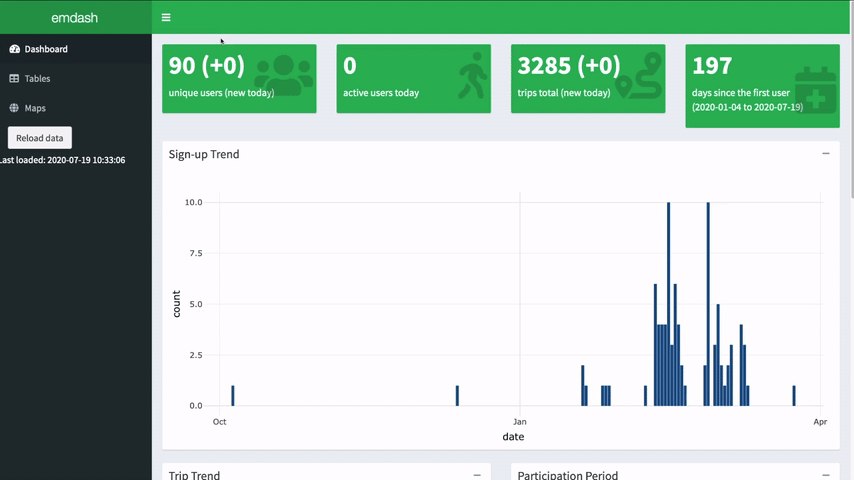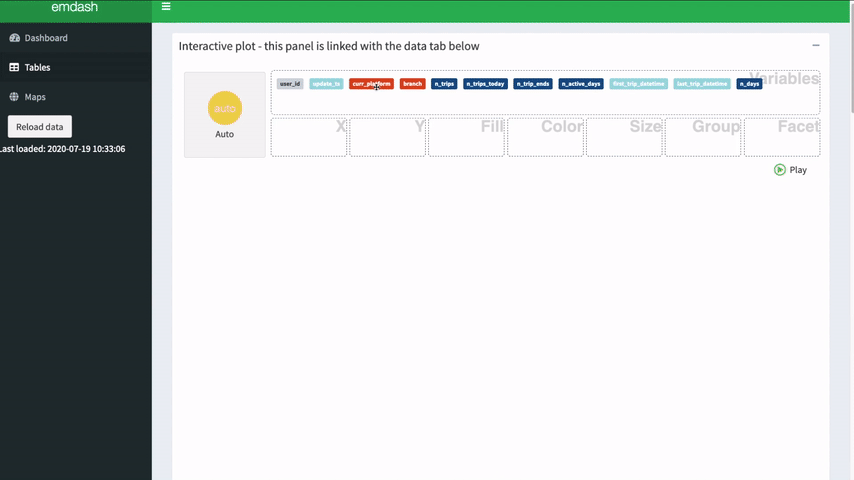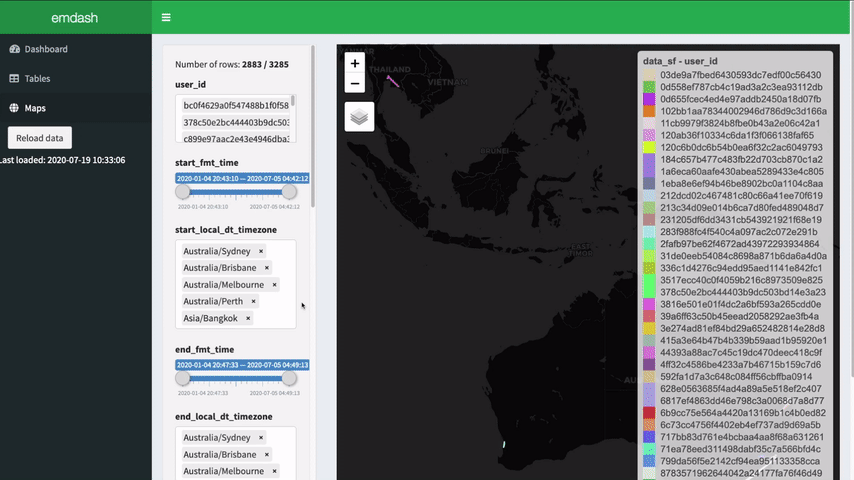emdash
The goal of emdash is to provide a deployer dashboard for an e-mission deployment.
| Tab | Example |
|---|---|
| Dashboard |  |
| Tables (and interactive visualisation) |  |
| Map |  |
Installation
You can install emdash from GitHub:
install.packages("remotes")
remotes::install_github("asiripanich/emdash")Alternatively, with Docker CLI:
docker pull amarins/emdash
docker run -d -p 80:80 --name emdash amarins/emdash
After that, open your favourite browser and type localhost or
http://0.0.0.0:80 in the URL bar to see the dashboard.
How to use the dashboard
Run locally
To use the dashboard you must config the port of your e-mission mongoDB
in the emdash::run_app(mongo_url = 'mongodb://localhost:27017')
command. As you can see, the default is 27017. The easiest way to use
this dashboard with your e-mission deployment is to create a SSH tunnel
to the e-mission mongo on your e-mission server.
ssh -L {my-local-port}:localhost:{remote-server-port} username@your-server-ip-address-or-domain-name
ssh -L 27017:localhost:27017 ec2-user@123.12.12.1
Here is how you launch a e-mission dashboard with emdash.
library(emdash)
emdash::run_app(mongo_url = 'mongodb://localhost:27017')Loading test data
This repository contains a test mongodump with entries from the e-mission unit test real data.
- 2016-07-22
- 2016-07-25
- 2016-07-27
- 2016-08-04
- 2016-08-05
- 2016-08-09
- 2016-08-10
- 2016-08-11
It includes background sensed data (background/*), analysis results
(analysis/*) and the mode and purpose confirm objects from the master
branch (manual/mode_confirm and manual/purpose_confirm).
To load the data into a local mongodb,
$ unzip test-data/2016_jul_aug_test_trips.zip
$ mongorestore
If you would like to load additional data, you can do so through the e-mission server.
For convenience, you may use this docker_start_test_mongodb.sh for
starting up a Docker container that will run the test database.
Use with Docker
We provide a Dockerfile to run this dashboard. In the future we may include this as part of an e-mission docker-compose file which will be hosted on the e-mission-docker github repo.
Be warned that the emdash Docker image is quite large, around 2.8 GB, and take a while to build. You can use pull from the emdash docker repository and skip the wait!
How to customise the dashboard
First you need to know R and Shiny. I tried to modularise each component as much as possible so that the dashboard is easy to be customised. Any advices to improve the dashboard are welcomed. :)
Customise query functions
See R/utils_query_database.R.
The functions in this script are for querying data from the e-mission mongoDB database.
Customise data
See R/utils_tidy_data.R.
The functions in this script are for cleansing and transforming data
queried using the functions in R/utils_query_database.R.
Citation
Use emdash in your work? Consider citing the package:
@software{siripanich_amarin_2021_4456315,
author = {Siripanich, Amarin and
Rashidi, Taha and
Shankari, K},
title = {asiripanich/emdash: v1.2.3},
month = jan,
year = 2021,
publisher = {Zenodo},
version = {v1.2.3},
doi = {10.5281/zenodo.4456315},
url = {https://doi.org/10.5281/zenodo.4456315}
}
